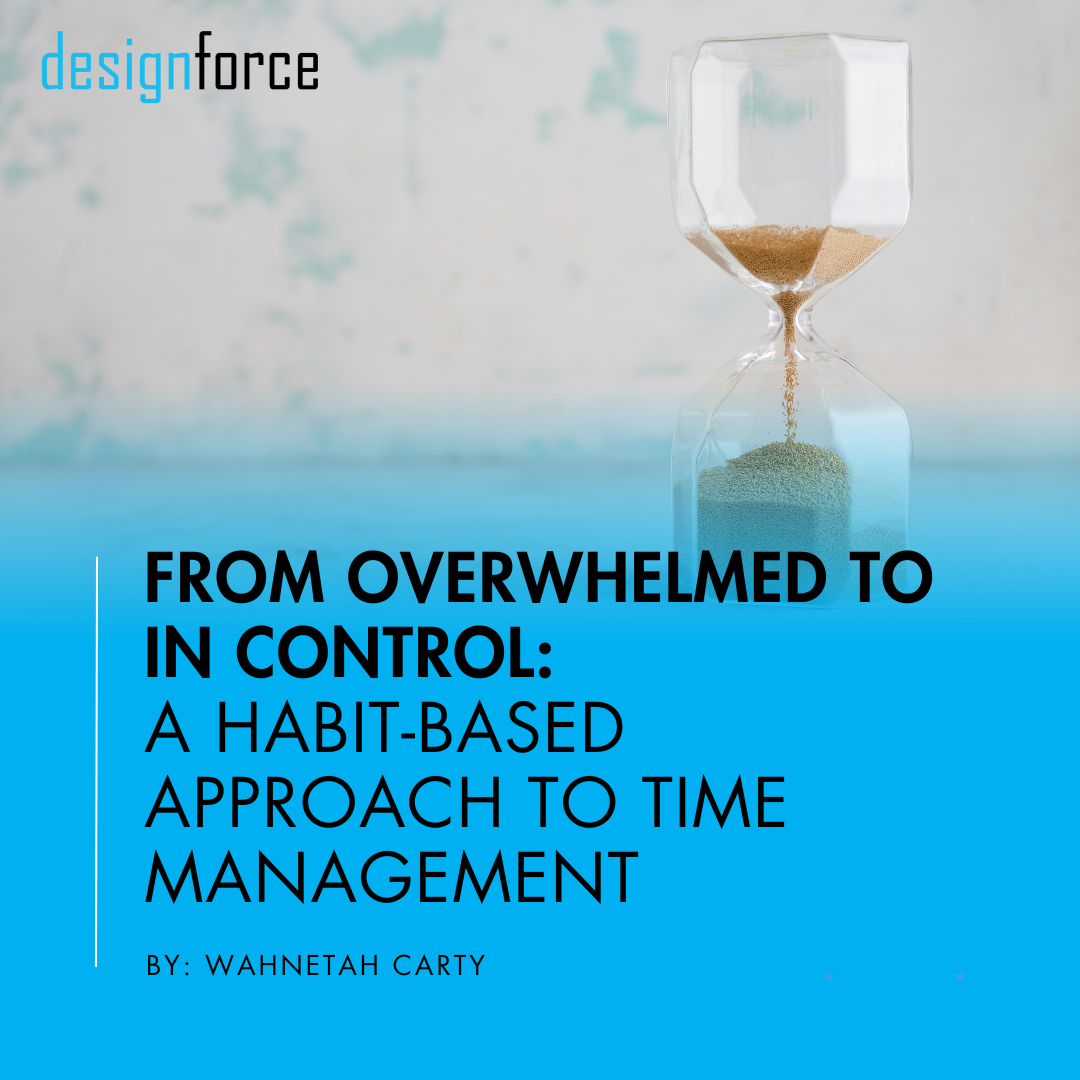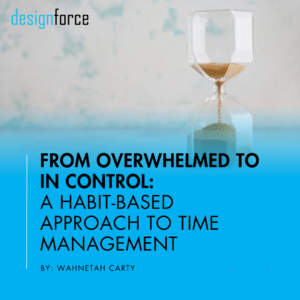By: Wahnetah Carty
I learned early in life that time management isn’t just a nice-to-have—it’s essential. When I failed to manage my time, the consequences were real: missed deadlines, subpar work, and frequent reprimands. In college, poor time management and a lack of prioritization cost me dearly—I failed multiple classes and lost my first scholarship. That wake-up call forced me to take a hard look at my habits. If I wanted to succeed, I had to stop procrastinating and start taking control of my time. Of course, as anyone who’s tried it knows, mastering time management is much easier said than done.
As a college athlete balancing practices, travel, and coursework, I had no choice but to become more disciplined. Later, as a teacher juggling lesson planning, grading, and mentoring, those skills became even more critical. And now, as a career coach and recruiter in the fast-paced AEC industry, I see firsthand how strong time management can make or break a career. It’s a skill that evolves, but never stops being essential.
When I first set out to improve my time management, I fell into a familiar trap: buying a new calendar or planner every year, hoping it would magically solve my problems. But no matter how pretty or expensive the tool, I still struggled to stay on top of things. The frustration built, and eventually, I felt defeated, like maybe I just wasn’t wired for good time management. It wasn’t until I started talking to colleagues who actually excelled in this area that things clicked. I didn’t need better tools—I needed better habits. The following three simple yet powerful strategies helped me become more efficient and more in control of my days:.
- Prioritizing
One of the biggest shifts I had to make was learning how to prioritize. For a long time, I treated every task like it was equally important, thinking that staying busy meant being productive. To help with prioritization, I started using the Eisenhower Matrix. This tool helped me categorize my tasks into four areas: tasks to do first, tasks to schedule for later, tasks to delegate, and tasks to delete.
The matrix helped me map out my week and visually see what tasks were important based on their deadlines. It also allowed me to free up time by saying no to tasks that weren’t crucial to my day or week at that moment. Additionally, I began discussing my tasks with my supervisor in a weekly 1:1 meeting. This collaboration gave me a new perspective on why some tasks were more important than others.
The biggest lesson? Not everything deserves your attention right now. As an AEC career and recruitment consultant, I often speak with emerging project managers who struggle with time management. They’re not always running out of time; they’re just not focusing on the right things. That’s why I always recommend starting with the Eisenhower Matrix and then asking, is it really your time management that’s broken, or is it your strategy?
- Setting Boundaries
One of the most powerful time management tools I’ve adopted is also the simplest: setting boundaries. I used to say yes to everything out of guilt, fear of disappointing others, or the belief that I should be able to handle it all. The result? Overpromising, under-delivering, and constant burnout. Setting boundaries not only helped me become more confident in my work but also made my workload more manageable each week. Struggling with boundaries isn’t limited to tenure or experience; it happens at all levels. I had to learn that setting boundaries was not only acceptable but necessary for effective time management.
In the AEC industry, tight deadlines and last-minute changes are part of the deal. Sometimes they’re unavoidable. But when they are avoidable, we owe it to ourselves and our teams to speak up. Revisit expectations around communication, timelines, and deliverables early and often. And don’t skip the “lessons learned” meeting at the end, it’s a small step that pays off in better boundaries and smoother projects down the line.
- Auditing Your Week
By Friday, all I want to do is log off and unwind, but one of the most valuable habits I’ve developed is taking 10 minutes to audit my week. I compare how I planned to spend my time with how things actually played out. I do this in real time too. When a task runs long, I pause to figure out why. That insight helps me build more realistic schedules and leaves room for the unexpected.
AEC professionals, in particular, should make a habit of auditing their weeks, especially when there are hard deadlines. Weekly audits help you spot inefficiencies, adjust timelines, and delegate more effectively. They also shine a light on which meetings are truly necessary—and which could’ve just been emails.
Auditing won’t change everything overnight. But over time, it builds awareness, improves planning, and reduces stress. No one nails time management 100% of the time, and that’s okay. The goal isn’t perfection, it’s progress. Keep showing up, keep learning, and your time will start working for you, not against you.

Related Posts
Let's learn together.
Stay inspired and in the know on all things A|E|C.
Sign up for our monthly newsletter.










